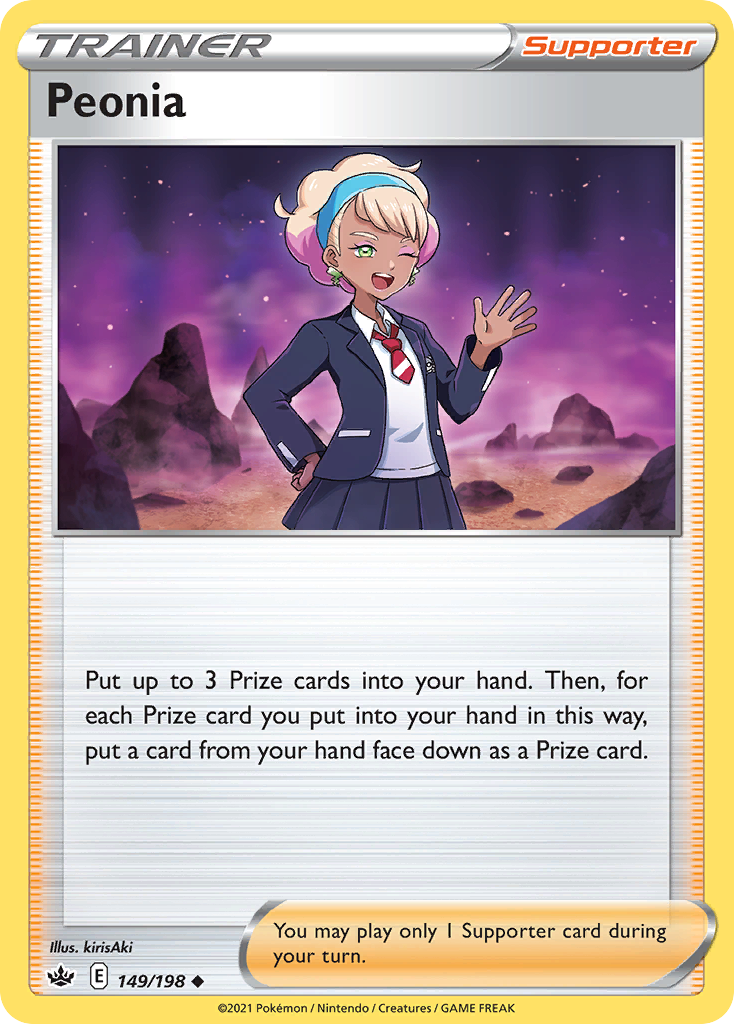Managing Your Prizes

Prizing is one of the most unique aspects of the Pokemon Trading Card Game. In traditional formats like Standard or Expanded, prizing can remove an important tech card in an unfavorable matchup, or force a player to conserve Energy in the mid-game. But in a Singleton format like the Gym Leader Challenge, where decks may rest their entire strategy on one Pokemon or Supporter, these Prize cards introduce a much more impactful wrinkle to the game. Understanding how to play around these potential challenges can be the difference between winning and losing in GLC.
Rescuing Your Prizes

Two Supporter cards instantly come to mind when considering how to deal with unlucky prizing. The first is Gladion, which can instantly retrieve any prize card when played. For many players, this is the best option available, as they need to rescue a member of a key Evolution line or complete a pivotal combo. Gladion’s ability to retrieve any specific card on demand makes it a very appealing option for any deck to increase its consistency.

The other Prize-management Supporter is Peonia, new in Chilling Reign. The downside of not being able to select which Prizes are retrieved is offset by the benefit of returning whatever cards you want to your Prizes - you can stash Pokemon or Trainers which may no longer have a purpose in this specific game.
Between these two cards, it can be argued that Gladion is more impactful for combo-heavy decks as it means the key players will always show up to work, whereas Peonia has its uses for general consistency and keeping multiple lines of play open.
Viewing Your Prizes
While picking a card out of the Prizes on-demand is a powerful effect, it may not always be worth using your Supporter for turn. Luckily, there are a few non-Supporter cards which offer a more lightweight solution to a bad set of Prizes.

Town Map, printed in the Black & White and X & Y eras, is a really nice Item card to include if you’re concerned about losing something important. It doesn’t provide you with the instant Prize swap that Gladion does, but with how frequently you knock out your opponent’s Pokemon in the GLC you will still probably retrieve what you need before it’s too late.
If you’re running Psychic, you may consider Poipole from Lost Thunder. This card is one of several choices that can evolve into Naganadel, a versatile, low-maintenance attacker. With the Eye Opener attack and a decent memory, you can have the same effect as Town Map while setting up an attacker.

Finally, you could consider the very niche Beast Ball from Celestial Storm. This card is admittedly limited in its usefulness due to the fact that few Ultra Beast Pokemon share types in this format - Psychic, Steel, and Fighting are probably the only types with enough Ultra Beasts to make this card worthwhile. But some of them, particularly Kartana, have incredible effects that are worth using in any game.
Should You Worry About Your Prizes?
Now that we’ve identified which cards may be used to counter the randomness of prizing, we should ask what kind of decks care about countermeasures. Most of the cards mentioned above didn’t see any play in Standard and continue to remain left out of decklists in Expanded - why? How much do Prizes affect any given game? What kind of decks can spare a card or two to shore up their Prizes? Can we build our decks to avoid including these Prize-management cards altogether? To answer these questions, let’s take a closer look at some sample GLC decklists to see what we might learn from them. This is Andrew Mahone’s Grass GLC deck from the August 3rd TrickyGym stream. We should note that this deck is generally agreed to be one of the best in format - it has incredible consistency with Grovyle and Shiinotic’s Abilities that search out Pokemon, and Venusaur and Rillaboom ensure that your board is always flush with energy to pull off powerful attacks every game.

This deck doesn’t run any cards that interact with the Prizes because it builds its strategy wide. Although the Venusaur / Rillaboom combo is insane for its ability to effectively get six Energy on the board in one turn, the player is still adding two or three per turn if one of these Pokemon are missing. The risk/reward calculation here is great - in almost 95% of games, you’ll have at least one of these two complete Evolution lines in your deck. The deck also has several attacking options - you’ll have at least one Basic attacker in your deck >99% of the time. Thanks to the incredible consistency of Grovyle and Shiinotic’s search Abilities, individual Pokemon are easily accessible to this deck, so a game plan can be assembled regardless of what’s Prized.
[Note: the above statistics are derived from a series of articles written by X-Act on probability in the Pokemon TCG in 2005 - even now the mathematics are invaluable to understanding the game.]
This next deck is Andrew Mahone’s Water spread deck from the July 27 TrickyGym stream. It relies on spreading damage across the opponent’s board in order to pick off weak Pokemon and take multiple knockouts at once. Key spread attackers include Greninja, Shining Volcanion, and the powerful Amazing Rare Kyogre.
This deck includes a copy of Gladion because of how combo-oriented it is. Kyogre requires a whopping three different types of basic energy to attack - without Kyogre, the Lightning and Metal Energy are nearly useless. Furthermore, the only acceleration that exists in the deck is Frosmoth, so that and Snom are also crucial. Hence, Gladion is included to ensure the main strategy is always executable.
Conclusion
So, what have we learned? Looking at all the various ways there are to manage your Prizes in the TCG, many crowded GLC lists will struggle to find a spot for even one of these cards. So while a Gladion or a Town Map may be necessary for some more combo-heavy decks, it may be more advantageous to build a deck around prizing, such that it can deal with even the worst luck when setting up a game. Decks with multiple ways to do the same thing - search out Pokemon, accelerate energy, deal damage - will fare well in GLC because they’ll always have a way to do what they need to. For more radical, combo-oriented strategies, it may be worth it to include ways to rescue your Prizes so you aren’t stranded during the early- and mid-game. Either way, the inevitability of prizing in Gym Leader Challenge format means that players will have to take note of what resources are available to them and how to best build a winning strategy around these resources every single game.
- Andrew “ioneos” Pospeshil

